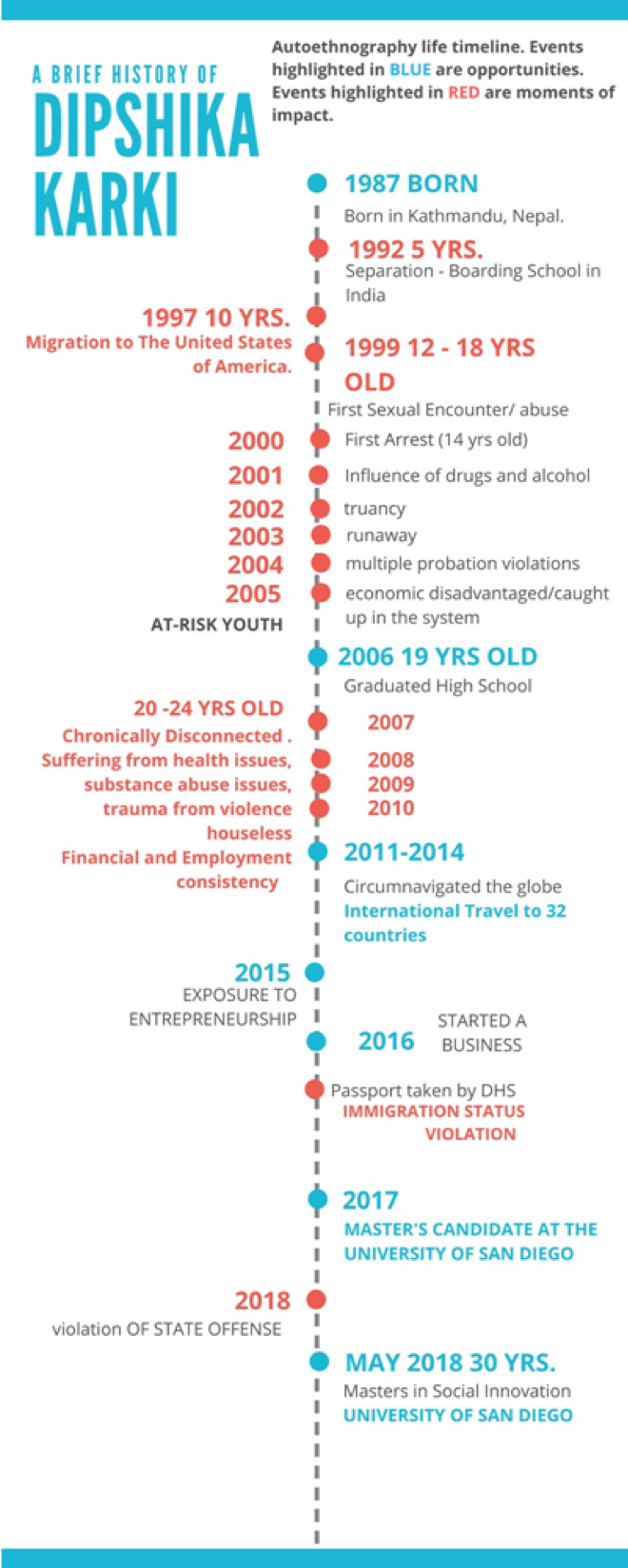 “How can we design a social enterprise that can help reduce female recidivism, enhance the human experience, and curate social impact in a way that is sustainable, scalable, and designed with purpose?”
“How can we design a social enterprise that can help reduce female recidivism, enhance the human experience, and curate social impact in a way that is sustainable, scalable, and designed with purpose?”
So begins the capstone project Dipshika Karki completed in partial fulfillment of the requirements for the Master of Arts in Social Innovation at the Joan B. Kroc School of Peace Studies at the University of San Diego (USD).
Dipshika (pronounced DIP-si-ka) is a first-generation Nepali American who immigrated to the United States in 1997. A former opportunity youth—a young adult between 16 and 24 who is neither working or in school—Dipshika had logged many records of traffic, court and criminal cases within a 10-year period.
When she was 9, she was experiencing culture shock and issues with migration and struggling with her identity. She was bullied in school and had a hard time adjusting to her new environment. At 11, Dipshika met an older boy whose influence changed the course of her life. Though she had been getting good grades, Dipshika soon started skipping school, and took up smoking and drinking. She was 14 the first time she came in contact with the law.
Though some positives came of this time, including refocusing on her writing and working with the local health department to develop teen prevention programs and community and arts events, it was also a turbulent period, filled with depression and self-destructive behavior.
“I was breaking curfew, fighting, skipping school, and somehow always seemed to run into the law,” she wrote. “Not having a license and [having] a juvenile record limited my opportunities and access to economic resources. I took on the label of being an at-risk and disconnected youth.”
“I had to comply with a lot of community service hours, and community service was the only access to freedom I had after school, so I started getting involved in everything,” Dipshika shared in her capstone report.
“My life was such a duality of complex cultures interconnected and disconnected from one another,” Dipshika wrote. “I felt like I was living two lives and switching roles between who I was internally, and who I expressed I was outwardly…I was struggling with consistency. I was struggling with life, and mostly I was struggling with myself.”
Dipshika has had to go through more challenges, but with the support of her parents, she graduated from high school. She would later earn her bachelor’s and master’s degrees.
In 2016, while at USD, Dipshika started a social enterprise called CREATIVHOUSE, which aimed to reduce youth recidivism and provide opportunity youth and young adults with services and access to resources to create social impact hiring—hiring disadvantaged individuals with the goal of creating a positive impact on the individual, their families, and ultimately to their community.
While attending the 2018 Opportunity Summit, which she learned about from USD Professor Karen Henken, Dipshika met a staff member from the County of San Diego Parks and Recreation Department at a breakout session who had mentioned the department was hiring. Through this connection, Dipshika applied, but eventually became discouraged when she had to undergo a background check: “I received a call from the HR specialist asking more questions on a charge that occurred when I was 21…I felt like I am back to square one despite my experience, education, qualifications and skill level.”
“They said they need more time to decide, which means more time that I won’t be gainfully employed,” Dipshika said. “I share this with you as a piece of reality that policies and regulations restrict hopeful and qualified candidates leaving youth and young adults in chronic disconnection.”
After a 3-month waiting period, Dipshika did eventually get the job as a program coordinator for a youth diversion program called SD Nights, designed to prevent youth disconnection and delinquency in San Diego. In November of 2018, Dipshika was awarded the Director’s Award “for the outstanding teamwork and customer service implementing and expanding the SD Nights program to serve at-risk-youth at over 200 events and 10 cities throughout the county.”
In addition to prevention, intervention and easing of hiring restrictions, Dipshika believes another way we can find solutions for disconnection is to have opportunity youth learn more about themselves and create opportunities for themselves by finding their inner purpose through design thinking and systems mapping.
 As part of her capstone project, Dipshika put together an autoethnographic report, mapping her life showing opportunities and moments of impact, as well as charting her criminal history within a 10-year period, using the above processes to put down on paper all the details about her life.
As part of her capstone project, Dipshika put together an autoethnographic report, mapping her life showing opportunities and moments of impact, as well as charting her criminal history within a 10-year period, using the above processes to put down on paper all the details about her life.
“I think it can be helpful to anyone to assess pain points or points of impact to seek customized solutions,” Dipshika said. “Logging my life helped me understand myself better, and where I fit into the overall system as a whole. I think it can be equally beneficial to anyone dealing with various forms of conflict or someone who is seeking a deeper insight on a particular topic.”
“I will be honest and say that this type of research into myself was emotionally draining. I went through months of reflection and analysis, mostly about the things I chose to forget about my past experiences. This project has helped me provide a form of self-therapy and has led to a path of healing and empowerment that didn’t exist before.”
“Also, charting helped me see all the good I had done in my life,” Dipshika added. “Sometimes we can get consumed with labels and mistakes we have made. We get accustomed to our associations with our failures, but I felt proud that with all the bad things, there was so much good also.”
“All of my experiences—good and bad—have shaped the woman I am today,” Dipshika shared. “It has provided me a title of entrepreneur. It has led me to the field of social innovation and brought me to my passion in the youth social impact sector.”
Dipshika has since facilitated design thinking workshops so other young adults can map their own lives. She is committed to youth advocacy and wants to expand her business to do more social good.
From her self-study and evaluation, Dipshika arrived at these key findings:
- Situating yourself in the research is a difficult process due to the validation of each personal experience as it applies to the broader body of research.
- Identifying areas of impact in regards to positive and negative experience allowed me to see patterns of lived experiences.
- A girl who is at-risk ages of 5–17 years old is more likely to become a disconnected young adult ages 16–24 years old.
- Females who are disconnected are more likely to adopt a life of crime.
- Females who are at-risk or disconnected have specific challenges that cause barriers to economic empowerment.
According to her research, disconnected female youth are up to 50 percent more likely to come in contact with the law. She also found that that there is a lack of support around youth and social enterprises that drive youth employment and build new interventions due to limitations on funding and resources.
“There are many institutions working in this sector,” Dipshika wrote in her report. “Yet, collaborative co-working processes are excluded and replaced with competitive and individual silos of interventions working separately, instead of together.”
Instead of seeing this as a problem, Dipshika wrote, “This provides an opportunity to strengthen public and nonprofit sectors to build reliable and sustainable partnerships. The private sectors can develop dedicated funding to address barriers and challenges to promote social impact hiring and educate the public on youth employment issues in their communities.”
In the future, Dipshika plans to attain a Ph.D. in business and entrepreneurship.
“I just want to be an advocate for opportunity youth and disconnected youth,” Dipshika said. “I believe that providing REAL opportunities to this demographic of youth can unlock huge amounts of potential to create the next generation of problem solvers. I want people to understand that you are not the things that happen to you. You can decide to change at any point in life and really help others, help your communities and the world will understand.”
To learn more about opportunity youth in San Diego County and how you can help reduce disconnection, attend our next Opportunity Summit on May 2, 2019.
